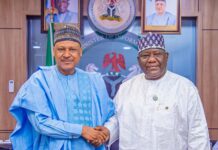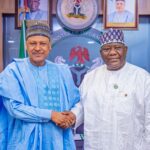President Bola Tinubu has directed the immediate reopening of Nigeria’s land and air borders with the Republic of Niger, along with the lifting of various sanctions against the country. The directive, announced by presidential spokesman Ajuri Ngelale, aligns with decisions made at the recent ECOWAS Authority of Heads of State and Government summit held in Abuja on February 24, 2024.
At the summit, ECOWAS leaders collectively agreed to lift economic sanctions imposed on several West African nations, including Niger, Mali, Burkina Faso, and Guinea. President Tinubu’s directive specifically targets the Republic of Niger, aiming to restore normalcy in bilateral relations and regional economic cooperation.
Effective immediately, the following sanctions imposed on Niger will be lifted:
- Closure of land and air borders between Nigeria and Niger Republic
- ECOWAS no-fly zone on all commercial flights to and from Niger Republic
- Suspension of all commercial and financial transactions between Nigeria and Niger
- Freeze of all service transactions, including utility services and electricity to Niger Republic
Additionally, frozen assets of the Republic of Niger in ECOWAS Central Banks and those of state enterprises and parastatals in commercial banks will be unfrozen without delay. President Tinubu further directed the lifting of Niger’s suspension from financial assistance and transactions with institutions such as EBID and BOAD. Travel bans on government officials and their families are also to be lifted promptly.
Furthermore, President Tinubu has approved the lifting of financial and economic sanctions against the Republic of Guinea, signaling a broader effort to foster regional stability and cooperation.
Amid Nigeria’s challenging economic landscape, the reopening of borders and the lifting of sanctions against Niger hold significant economic implications. By restoring trade and financial transactions, Nigeria stands to benefit from increased cross-border commerce and investment opportunities. Enhanced regional cooperation can stimulate economic growth, particularly in sectors such as trade, transportation, and energy. Additionally, improved diplomatic relations with neighboring countries can bolster Nigeria’s position within ECOWAS and contribute to broader regional stability, potentially attracting foreign investment and fostering economic resilience.



















